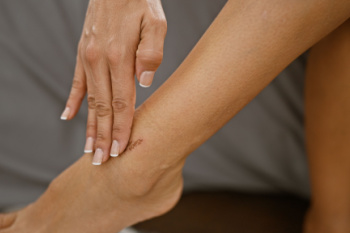
Properly caring for foot or ankle surgical scars is closely linked to the different stages of wound healing. When preparing a patient for surgery, it is important to consider factors that cannot be changed, such as age and any history of raised scars. To prevent scars from getting worse, the most important thing to control is the tightness of the wound during healing. This depends on how the surgical cut is made. Usually, cuts are made along the natural lines of the skin, but in some areas, there are no such lines. Taking care of a surgical scar does not stop when the stitches are removed, and it should continue for about a year. Podiatrists will keep checking the scar during follow-up visits to make sure it is not getting worse. If it starts to become raised and thick, steroid injections and other treatments can be used to help. If you are having foot or ankle surgery, it is suggested that you speak to a podiatrist about past wound healing
Wound care is an important part in dealing with diabetes. If you have diabetes and a foot wound or would like more information about wound care for diabetics, consult with one of our podiatrists from Arcadia Foot and Ankle. Our doctors will assess your condition and provide you with quality foot and ankle treatment.
What Is Wound Care?
Wound care is the practice of taking proper care of a wound. This can range from the smallest to the largest of wounds. While everyone can benefit from proper wound care, it is much more important for diabetics. Diabetics often suffer from poor blood circulation which causes wounds to heal much slower than they would in a non-diabetic.
What Is the Importance of Wound Care?
While it may not seem apparent with small ulcers on the foot, for diabetics, any size ulcer can become infected. Diabetics often also suffer from neuropathy, or nerve loss. This means they might not even feel when they have an ulcer on their foot. If the wound becomes severely infected, amputation may be necessary. Therefore, it is of the upmost importance to properly care for any and all foot wounds.
How to Care for Wounds
The best way to care for foot wounds is to prevent them. For diabetics, this means daily inspections of the feet for any signs of abnormalities or ulcers. It is also recommended to see a podiatrist several times a year for a foot inspection. If you do have an ulcer, run the wound under water to clear dirt from the wound; then apply antibiotic ointment to the wound and cover with a bandage. Bandages should be changed daily and keeping pressure off the wound is smart. It is advised to see a podiatrist, who can keep an eye on it.
If you have any questions, please feel free to contact our offices located in Scottsdale, North Scottsdale, Mesa, and Sun City, AZ . We offer the newest diagnostic and treatment technologies for all your foot care needs.